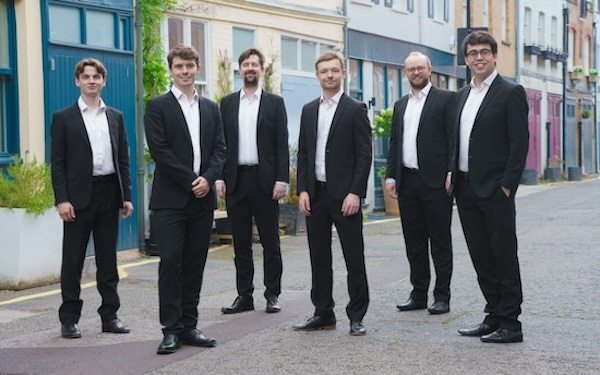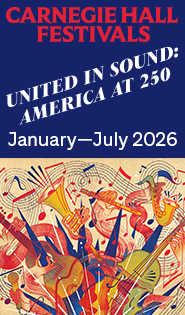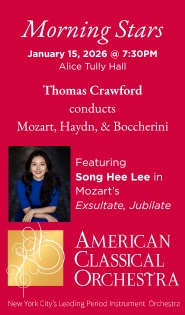The Gesualdo Six offer a moving musical experience with “Secret Byrd”

The program titled “Secret Byrd,” performed by The Gesualdo Six with Abendmusik Saturday at the Cathedral Church of St. John the Divine was an extremely moving experience on many levels. These ranged from the spiritual to the aesthetic, but historical context also played a vital role as well. The mix proved to be a very popular draw, resulting in two sold-out performances on the same evening.
Conceived and directed by Bill Barclay, Music Before 1800’s artistic director, “Secret Byrd,”is a reflection on the life and music of the great English Renaissance composer and his times, as well as a belated commemoration of the 400th anniversary of his death. Byrd’s birthdate is uncertain; not so that of his death. Byrd was well into his eighties when he died on July 4, 1623, with the date noted in the records of the Chapel Royal by an entry describing him as “a Father of Musick.”
That Byrd would live to such a great age was an impressive feat. Not only due to his span of years—the average life expectancy in Tudor England was just 35 years—but also to his midlife conversion to Roman Catholicism. The English Reformation was a bloody affair and for Catholics during the latter years of Queen Elizabeth I’s reign especially so. That Byrd successfully navigated such turbulent times was one inspiration for Barclay in creating this program, the glories of the composer’s music, undoubtedly being of even greater importance.
In the great houses, Catholic services were held in secrecy with the participants ever fearful of the Queen’s spies and paid informers. Rather than the impressive forces of the Chapel Royal, the largest choir of its kind in England, Byrd composed his three Latin Masses to be performed by a small number of singers, usually household servants. His Mass for five voices, probably composed in 1584, formed the musical core of the evening.
The main focal point of the performance was a large table set for a meal with flowers adoring the table in the cathedral’s crossing. Five of the gentlemen choristers of The Gesualdo Six were dresses as Elizabethan courtiers, while the sixth was robed as a Catholic priest. Members of the audience were invited to sit at the table. Water and wine were on hand throughout. Towards the end of the performance, small pieces of bread were distributed invoking the religious rite for which Byrd’s Mass was intended.
This was not the standard concert experience. People were invited to move about in the candlelight to engage with the music and the drama. It was a meditative, almost trancelike experience. Jarring, explosive knocks at one of the cathedral’s great doors toward the end of the program were a rude interruption. They portended that this clandestine gathering had been discovered by the Queen’s spies. The priest was led to safety escorted by a man bearing candles and a crucifix. There were indeed concealed places within houses, called priest holes, to which priests could be secreted away.
Although the Mass for five voices was the centerpiece of the musical offerings, selections from Byrd’s instrumental composition and his sacred vocal works in Latin were also performed. “Ye Sacred Muses,” Byrd’s musical elegy on the death of his colleague and mentor, Thomas Tallis, was sung midway through the program.
The music was sublime. When originally sung in a room of a private home, undoubtedly every word of the Mass was heard clear and distinct. In the vastness of St. John the Divine that was impossible and likely never intended to be. To the extent that any real musical or textual details emerged was almost miraculous, and a testament to the musicality of the six singers.
One striking example was the dynamic and mood changes that emerged in the Credo of the Mass, when they sang of Jesus Christ’s suffering and death in soft, somber tones. In an instant, there was jubilation in the air, as his resurrection was announced triumphantly. Equally remarkable was the sheer beauty of the men’s voice when singing in soft tones that took flight in the great space.
Abendmusik performed before and after the main body of the program. Many crowded up close to experience their music making and inspect their period string instruments, but the better vantage point was to distance oneself. The aura cast by their playing was mysterious and magical, as indeed was the entire experience of “Secret Byrd.”
Music Before 1800 presents “Letters to a Young Poet” with the Diderot String Quartet, 4 p.m. Dec. 15. mb1800.org



Posted Nov 10, 2024 at 7:42 pm by Sallie Erichson
This was no disappointment and it is a clear indication of the flowering of the ancient music movement,